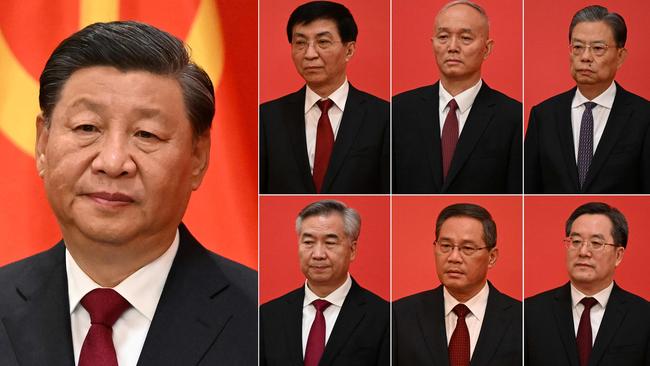Xi Jinping parades new team as he prepares for third term
He confirms his precedent-breaking re-election as China’s leader and stacked the communist party’s top decision-making body.

Xi Jinping has begun his second decade as China’s leader by stacking the Communist Party’s top decision making body with personal aides and loyalists, demonstrating his total dominance of Chinese politics.
The shake-up of the seven person standing committee, the Communist Party’s most powerful political institution, demoted voices that might have once challenged General Secretary Xi and promoted people whose careers he has sponsored during his strongman rule.
Mr Xi on Sunday afternoon confirmed an outcome that had looked near certain since he up-ended the Party’s leadership transition process in 2017 by refusing to appoint a successor.
“I was re-elected as general secretary,” China’s leader said in a rare address to the media in Beijing’s Great Hall of the People.
Mr Xi gave a cursory introduction of his new team after he led them into a red-carpeted room. He said his team of loyalists would guide China through an increasingly difficult international environment.
“We will not be daunted by high winds, choppy waters or even dangerous storms,” he said. “The people will always have our backs and give us confidence.”
Mr Xi said they would work to make China the most powerful country in the world by 2049, a long-term goal for the Communist Party.
He did not take any questions. None of the other standing committee members said a word.
All four new members elevated to the Communist Party’s top decision making body have been supported by Mr Xi during his reign.
“There is only a Xi faction,” said Neil Thomas, a China analyst at Eurasia Group. “The big question now is how long can Xi’s dominance last?”
Li Qiang, 63, the Shanghai’s party chief who oversaw the city’s severe Covid lockdown, walked in second on Sunday, signalling he will likely take over as China’s next Premier. Comrade Li worked for Mr Xi in Zhejiang province in the mid-2000s.
Wang Yang, a member of the previous standing committee, had been the preferred candidate for the post in international financial markets. As well as not being designated as China’s Premier, comrade Wang — who had a reputation as an economic reformer — was removed from the Party’s central committee.
Li Keqiang, the departing Premier and once Mr Xi’s leadership rival, was also dropped from the 200-odd person central committee, further shrinking his position in the Party.
On Saturday, Premier Li’s mentor Hu Jintao — Mr Xi’s predecessor as China’s leader — was expelled from a Party meeting in a humiliating manner.
The other three new standing committee members are all closely associated with Mr Xi.
Cai Qi, 66, was the party boss in Beijing and is one of Mr Xi’s most trusted confidants. He worked for Mr Xi when they were posted to Fujian and later Zhejiang provinces.
Li Xi, 66, was the Party boss in Guangdong, but will now take over as the head of the feared Central Commission for Discipline Inspection, which Mr Xi has used to entrench and maintain his rule.
The third member Ding Xuexiang, 60, is currently Mr Xi’s chief of staff. Earlier, he worked for Mr Xi in Shanghai in 2007.
Aside from Mr Xi, only two members remain from the previous standing committee.
Zhao Leji, 65, was the comrade Mr Xi had charged with running the discipline commission over the last five years. Both have revolutionary fathers from Shaanxi province.
Wang Huning, 67, has been Mr Xi’s top ideologue, and is credited as the key architect of “Xi Jinping Thought”.
Both are expected to be put into new jobs.
None of Mr Xi’s six other comrades have been set up as a successor. Some analysts believe he intends to rule for life.
Cai Shenkun, a former journalist of China News Service, said Mr Xi’s re-election formalised the end of China’s “reform and opening up” period.
“We can clearly see the political and economic direction of China in the future,” said Mr Cai, who is now based in America.
“For the international community, Xi Jinping’s re-election means more turbulence … Peace in the Taiwan Strait will stand a severe test,” he told The Australian.




To join the conversation, please log in. Don't have an account? Register
Join the conversation, you are commenting as Logout